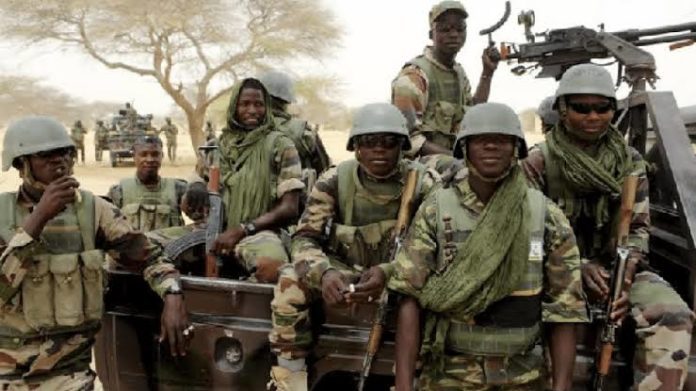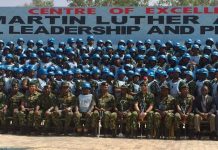By Richards Murphy
I was jolted out of my seat when I read the story published by Reuters titled ‘Islamic State fills the void in Nigeria as soldiers retreat to ‘super camps”. I imagined how such a piece laced with outright mischief, and illogical conclusions would have passed editorial integrity and certified fit for publication.
As a start, the whole concept of the Super Camp Strategy launched by the Nigerian Army was deliberately presented to picture a situation where troops would leave communities they hitherto protected to form clusters somewhere in a bid to avoid or minimize casualties. While this misrepresentation of fact can be stated to be uncharitable, it further reinforces the conspiracy theory that stated that Boko Haram/ISWAP fighters are receiving support from external sources, as well as the deplorable role most international NGOs are playing in the theatre of operations in North-East Nigeria.
I say this because the Reuters story quoted sources from the international NGOs in operation in North-East Nigeria and they based their judgment on what was availed them, which in my opinion is the height of unprofessionalism and unbecoming of a news medium such as Reuters.
It is more challenging to come to terms with the fact it was stated that the army’s withdrawal into large bases has coincided with a string of insurgent raids on newly unprotected towns and has left the militants free to set up checkpoints on roads as they roam more freely across the countryside. The first question is, were they referring to any part of North-East Nigeria or a neighbouring country? Because I am at a loss, just like the generality of Nigerians as to why anyone or organization would want to adopt a strategy such as the one advanced by Reuters in areas that it has complete control over. It is tantamount to leaving the comfort of one’s bedroom and taking solace elsewhere.
This is quite worrisome and somewhat an insult to our sensibilities as a people in Nigeria when foreign media organizations come in and scoop half-truths from their accomplices masquerading under various humanitarian nomenclatures in an attempt to unsettle the efforts of the Nigerian Military in the fight against terrorism in Nigeria mainly when successes are recorded and Boko Haram/ISWAP fighters retreating to the fringes of the Lake Chad Basin region.
This in my considered opinion is the height of mischief, and unsuspecting members of the general public must disregard it because, since the introduction of the Super Camp Strategy by the Nigerian Army in the fight against terrorism in North-East Nigeria, Boko Haram/ISWAP fighters have suffered heavy casualties as rightly reported by reputable news mediums in Nigeria.
The Super Camp Strategy is not a situation where troops would withdraw to “super camps” that can be more easily defended against insurgents as stated by Reuters. Instead, the Super Camp Strategy is one that is designed to create military presence everywhere in villages and localities of the troubled areas of Borno, Yobe, and Adamawa states.
I recall in a parley with members of the Borno Elders Forum, the Theatre Commander, Operation Lafiya Dole, Major General Olusegun Adeniyi, stated that the Super Camp Strategy will ensure fast mobilizing, quick reaction and more extended reach at tactical level, combined with the striking power of the Air Taskforce to see that the days of Boko Haram moving freely and passing in between static defence location is over.” Also, true to his words, the introduction of the Super Camp Strategy has seen to the presence of troops in places such as remote communities, unlike in times past where soldiers were stationed in military bases.
If the Super Camp Strategy is not a brilliant one, I don’t know what else to call it. And my guess is that those that do not want an end to the Insurgency in North-East Nigeria are those behind the Reuters story, and it is such a shame that Reuters with all its years of journalism would condescend so low to tow this dishonourable path.
This is on the heels that activities of international NGOs operating in North-East Nigeria have been suspect. For them, the war against terrorism in North-East Nigeria should not come to an end so they can continue to justify their stay in Nigeria as well as funding for their operations. This is aside from the fact that it has been speculated in some quarters that most of these NGOs are involved in espionage activities for the sponsors of Boko Haram/ISWAP terrorists.
In all of these, one thing comes to my mind, and it is the fact that with the introduction of the Super Camp Strategy, the end of Boko Haram/ISWAP is in sight, and this fact is not going down well with a group of actors and as such all must be done to discredit in its entirety. But again, would this new offensive against the operations of the Nigerian Military work? Would the Military hierarchy succumb to the Reuters blackmail?
Your guess is as good as mine. I believe that all must be done by the military hierarchy to sustain the tempo in its operations in North-East Nigeria, with regards to the Super Camp Strategy. And less I forget to mention that the Super Camp Strategy involves two critical components, which is taking the fight to the enemies in their domains and a routine introduction of counter-insurgency strategies that always takes the Boko Haram/ISWAP fighters unawares as against what was obtainable in the past.
At this point, the likes of Reuters and its accomplices should adopt another strategy in their attempt to mislead members of the unsuspecting general public. The attempt at discrediting the Super Camp Strategy is feeble in its delivery. And those afraid of the end of Boko Haram/ISWAP should do the needful, which is to pack their belongings and leave Nigeria, instead of the futile attempt at distorting facts.
Murphy is a security expert based in Calabar.
Join Television Nigerian Whatsapp Now
Join Television Nigerian Facebook Now
Join Television Nigerian Twitter Now
Join Television Nigerian YouTUbe Now





